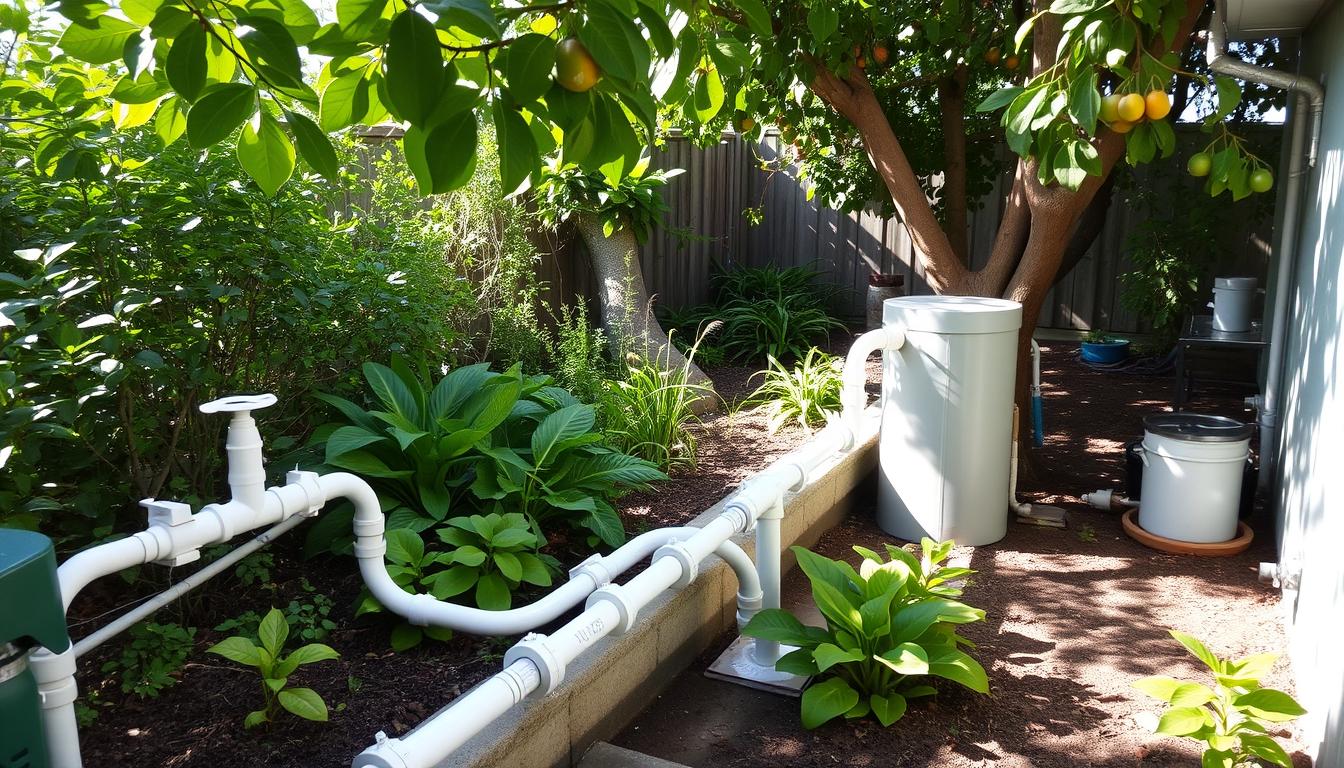Have you ever wondered how you could save water and reduce your environmental impact at home? The answer might lie in the intriguing world of greywater systems. These innovative plumbing solutions allow you to recycle and reuse household wastewater, transforming it into a valuable resource for your garden and landscape. But just how safe and effective are these systems in the context of permaculture?
Key Takeaways
- Greywater systems offer a sustainable solution to water conservation by recycling household wastewater.
- These systems can significantly reduce the demand on freshwater resources, making them a crucial component of permaculture practices.
- Proper installation and maintenance are essential to ensure the safe and effective use of greywater systems.
- Greywater systems can be integrated into both residential and commercial applications, contributing to a more eco-friendly future.
- Regulations and codes governing greywater systems vary by location, so it’s important to research and comply with local requirements.
What are Greywater Systems?
Greywater systems are designed to collect and recycle household wastewater from sources like sinks, showers, and washing machines, known as “greywater.” This water can then be safely reused for irrigation or other non-potable purposes, reducing the strain on freshwater resources and providing valuable nutrients for landscaping and gardens.
Understanding Greywater Sources
Greywater is distinct from “blackwater,” which comes from toilets and contains higher levels of contaminants. Greywater typically contains fewer impurities and can be easily treated and repurposed, making it a valuable resource in sustainable living. By understanding the sources of greywater, homeowners and businesses can implement effective recycling systems that contribute to water conservation and cost savings.
Differentiating from Blackwater
Unlike greywater, blackwater from toilets and certain appliances contains higher levels of organic matter, pathogens, and other contaminants. Proper treatment and disposal of blackwater is essential to protect public health and the environment. Greywater systems, on the other hand, allow for the reuse of relatively clean wastewater, reducing the overall burden on wastewater treatment infrastructure.
“Greywater systems are a cost-effective and eco-friendly way to conserve water, reduce utility bills, and provide valuable nutrients to landscapes and gardens.”
Benefits of Greywater Recycling
Greywater systems offer a host of advantages that make them a smart choice for eco-conscious homeowners and businesses. From water conservation to cost savings, these systems provide a sustainable solution for managing household or commercial wastewater.
Water Conservation
One of the primary benefits of greywater recycling is its ability to significantly reduce freshwater consumption. By diverting and reusing greywater from sinks, showers, and washing machines, these systems minimize the demand for clean, potable water, which is often in short supply in many regions. This water conservation approach helps preserve valuable water resources and contributes to a more sustainable future.
Cost Savings
Implementing a greywater system can also lead to substantial cost savings on utility bills. By reducing the need for freshwater, homeowners and businesses can expect to see a decrease in their water and sewage charges. Additionally, the long-term cost-effectiveness of these eco-friendly systems makes them a worthwhile investment for those seeking to reduce their environmental impact and save money in the process.
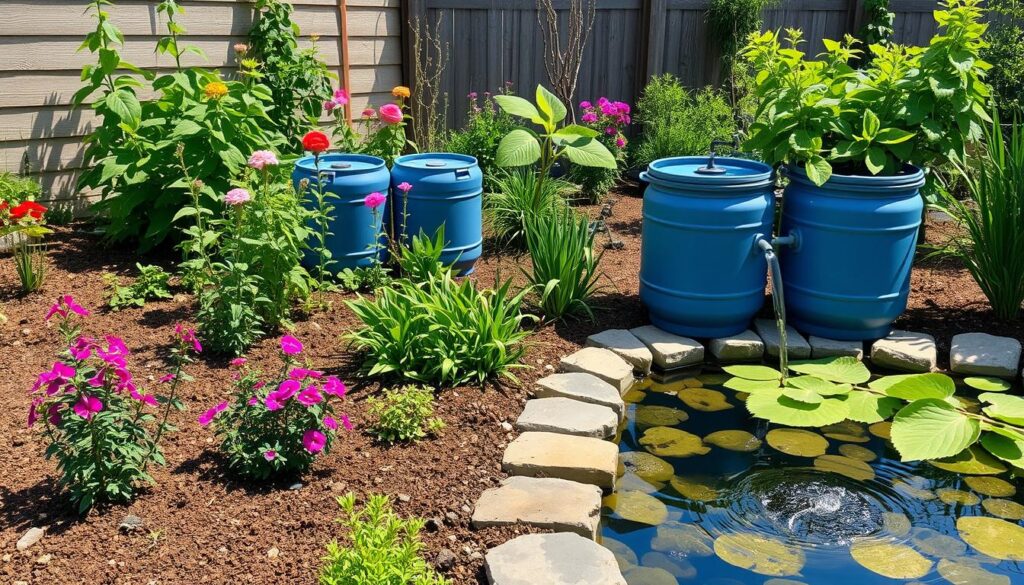
“Greywater recycling is a game-changer in the world of water conservation, offering both environmental and financial benefits for responsible consumers.”
Beyond the immediate cost savings, greywater systems also contribute to a more sustainable lifestyle by reducing the burden on wastewater treatment facilities. This, in turn, helps minimize the carbon footprint and energy consumption associated with wastewater management, making greywater recycling an all-around eco-friendly choice.
- Significant water conservation by reducing freshwater demand
- Cost savings on utility bills through decreased water and sewage charges
- Contribution to a more sustainable lifestyle by reducing wastewater treatment needs
Greywater Systems for Residential Use
Integrating residential greywater systems into homes offers a sustainable solution for water conservation and reduced utility costs. These systems are designed to collect, treat, and distribute greywater – the relatively clean wastewater from sinks, showers, and washing machines – for various non-potable applications around the property.
One of the primary benefits of residential greywater systems is their ability to significantly reduce freshwater consumption. By diverting greywater for landscape irrigation, toilet flushing, and other approved uses, homeowners can dramatically lower their overall water usage and potentially see a positive impact on their monthly utility bills.
Furthermore, sustainable plumbing solutions like greywater systems contribute to a more eco-friendly lifestyle. By recycling water that would otherwise be discharged into the sewer system, these systems help conserve precious natural resources and reduce the strain on municipal water infrastructure.
Versatile Applications
Residential greywater systems are remarkably versatile, offering a range of practical applications:
- Landscape Irrigation: Greywater can be safely used to nourish outdoor gardens, lawns, and other landscaping elements.
- Toilet Flushing: Recycled greywater can be directed to toilet tanks, reducing the demand for clean drinking water.
- Laundry: Some systems allow for the reuse of laundry water for subsequent wash cycles.
With the right design and installation, homeowners can seamlessly integrate a greywater system into their property, enjoying the benefits of sustainable plumbing and responsible water management.
“Greywater systems are a game-changer for homeowners looking to reduce their environmental impact and save money on their water bills.”
Greywater Systems for Commercial Applications
While greywater systems are often associated with residential settings, they can also be highly beneficial for commercial applications. Office buildings, restaurants, and hotels can all leverage the power of greywater recycling to significantly reduce water consumption and operating costs, all while enhancing their environmental sustainability.
Office Buildings
Office complexes can be significant water consumers, with water-intensive activities like restroom usage, cleaning, and landscaping. By implementing a greywater system, these commercial spaces can redirect greywater from sinks, showers, and washing machines to be reused for non-potable applications, such as flushing toilets and irrigating surrounding greenery. This not only conserves precious freshwater resources but also leads to substantial cost savings on utility bills.
Restaurants and Hotels
The hospitality industry, including restaurants and hotels, is another sector that can benefit greatly from commercial greywater systems. These establishments often have high water demands for activities like dish washing, laundry, and maintaining lush landscaping. By recycling the greywater generated from these operations, restaurants and hotels can reduce their reliance on municipal water supplies and reinvest the savings into other sustainability initiatives.
| Commercial Application | Water Savings Potential | Cost Savings Potential |
|---|---|---|
| Office Buildings | 30-50% | 20-40% |
| Restaurants | 40-60% | 25-45% |
| Hotels | 35-55% | 22-42% |
By embracing the benefits of commercial greywater systems, businesses can not only reduce their environmental impact but also reap substantial financial rewards through decreased water and sewage costs. As sustainability becomes an increasingly important factor for consumers and investors, incorporating these innovative solutions can also enhance a company’s reputation and competitive edge.
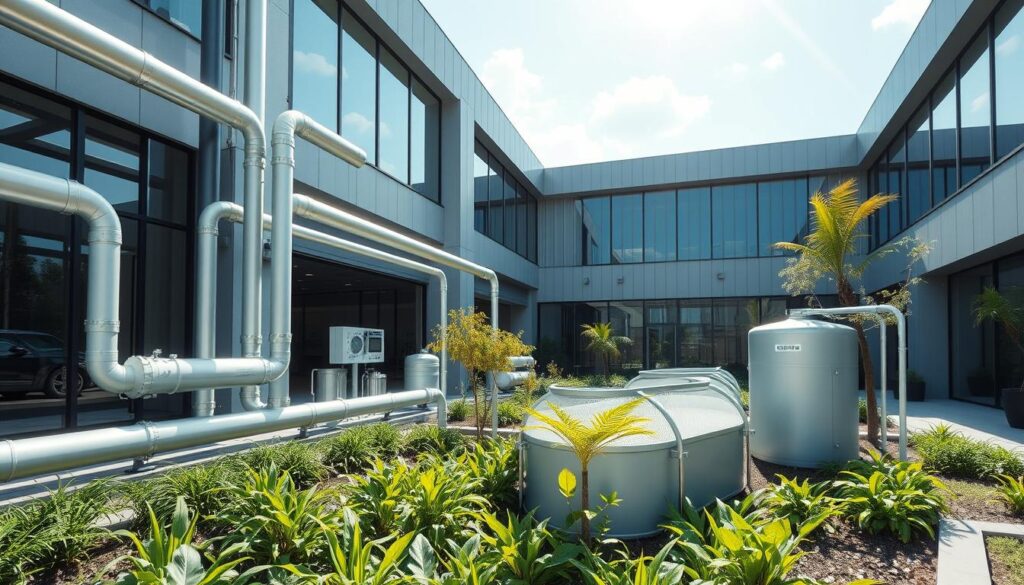
Greywater Treatment Options
Greywater systems employ various treatment methods to ensure the safe reuse of the collected water. These techniques play a crucial role in preparing the greywater for its intended use, whether it’s for landscape irrigation, toilet flushing, or other non-potable applications.
Biological Treatment
Biological treatment utilizes living organisms, such as bacteria and microbes, to effectively remove contaminants and pathogens from the greywater. This natural process mimics the way ecosystems purify water, ensuring the greywater is safe for reuse. By harnessing the power of these living organisms, biological treatment provides a sustainable and eco-friendly approach to greywater treatment.
Physical Treatment
Physical treatment techniques, such as filtration and disinfection, also play a crucial role in the greywater treatment process. Filtration systems remove solid particles, hair, and other debris, while disinfection methods, like UV light or chlorination, eliminate any remaining microorganisms. These physical processes work in tandem with biological treatment to create a complete and reliable greywater treatment solution.
By combining biological and physical treatment methods, greywater systems can effectively remove contaminants, reduce the risk of health and environmental issues, and provide a sustainable source of water for various non-potable uses. This comprehensive approach to greywater treatment is essential for ensuring the safety and efficacy of greywater recycling in permaculture and other sustainable living practices.
Greywater Systems in Permaculture
Greywater systems are an integral part of permaculture, a holistic approach to designing sustainable living environments. By integrating these systems with landscaping, gardeners and farmers can create a closed-loop ecosystem that maximizes the use of on-site resources and promotes water conservation.
Enhancing Landscape Productivity
When incorporated into permaculture design, greywater systems can provide valuable nutrients and moisture to support the growth of fruit trees, vegetable gardens, and other productive plantings. This helps to create a thriving, self-sustaining landscape that requires fewer external inputs and reduces waste.
By distributing greywater to the root zones of plants through driplines or mulch-based systems, gardeners can mimic natural water cycles and ensure that the recycled water is effectively utilized by the plants. This minimizes water usage and maximizes the benefits of this valuable resource.
Promoting Biodiversity
Integrating greywater systems with permaculture landscaping can also support the development of diverse and resilient ecosystems. The treated water supports the growth of a wide range of plants, which in turn provide food and habitat for a variety of beneficial insects, birds, and other wildlife.
This biodiversity enhances the overall health and stability of the permaculture system, creating a more robust and self-regulating environment that is less susceptible to pests, diseases, and other disruptions.
“Greywater systems are a fundamental component of permaculture, allowing us to close the water cycle and create thriving, self-sustaining landscapes.”
By embracing the synergies between greywater systems and permaculture design, gardeners and farmers can unlock the full potential of their land, transforming it into a productive, resilient, and environmentally-friendly oasis.
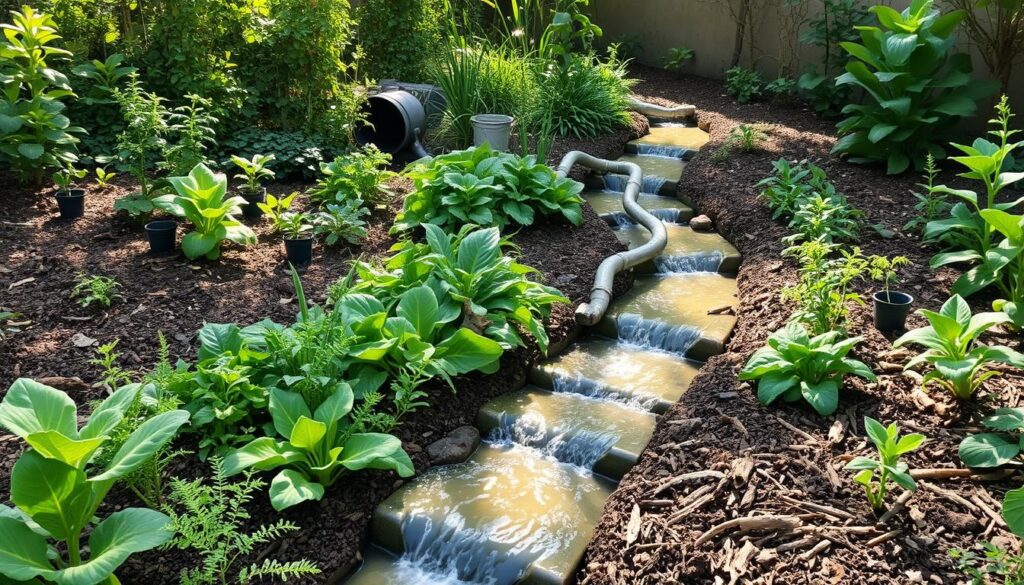
Regulations and Codes for Greywater Systems
As homeowners and businesses increasingly adopt greywater systems to promote sustainable plumbing, it’s crucial to understand the local and regional regulations that govern their installation and use. These guidelines ensure the safe and legal implementation of these water-saving technologies, addressing factors such as water quality standards, system design, and permitting requirements.
One vital consideration is the water quality standards set by governing bodies. Greywater, which originates from sinks, showers, and washing machines, must meet specific purity thresholds before it can be reused for landscape irrigation or other approved applications. Adhering to these standards helps protect public health and the environment.
In addition to water quality, greywater regulations often dictate the system design and installation process. This includes requirements for storage tanks, filtration systems, and distribution methods. Obtaining the necessary permits and inspections is typically mandatory, ensuring the system meets local building codes and safety protocols.
| Regulation | Requirement | Example |
|---|---|---|
| Water Quality Standards | Greywater must meet specific purity levels | Fecal coliform levels below 25 CFU/100 mL |
| System Design | Minimum tank size, filtration, and distribution methods | Minimum 50-gallon storage tank, sand filtration, and subsurface irrigation |
| Permitting | Mandatory permits and inspections | Building permit, plumbing inspection, and final approval |
By understanding and adhering to these greywater regulations, homeowners and businesses can ensure the safe and effective use of sustainable plumbing solutions, promoting water conservation and environmental stewardship.
Installation and Maintenance
Proper greywater installation and ongoing maintenance are crucial for the successful and safe operation of a greywater system. While professional installation is recommended, some homeowners may opt for a DIY greywater approach, which requires careful consideration of local regulations, system design, and maintenance procedures.
Professional Installation
For homeowners who prefer a hassle-free experience, hiring a professional greywater installation company is the way to go. These experts have the knowledge and experience to ensure your system is installed correctly, meeting all local codes and regulations. They can also provide guidance on the best system for your property and needs, as well as ongoing maintenance recommendations to keep your greywater system running smoothly.
DIY Considerations
DIY enthusiasts may choose to tackle the greywater installation themselves, but it’s important to do thorough research and planning beforehand. Understanding local regulations, designing the system layout, and properly installing components like diversion valves and irrigation lines are crucial for a successful DIY project. Regular maintenance, such as cleaning filters and monitoring water quality, is also essential for the long-term performance of a DIY greywater system.
| Factors | Professional Installation | DIY Greywater |
|---|---|---|
| Expertise | Experienced in greywater system design and installation | Requires research and knowledge of local regulations and system design |
| Time and Effort | Streamlined installation process | More time-consuming and hands-on approach |
| Compliance | Ensures system meets all local codes and regulations | Homeowner responsible for understanding and meeting regulations |
| Maintenance | Provides guidance and ongoing support | Homeowner responsible for all maintenance tasks |
Regardless of the installation approach, regular maintenance is essential for the long-term performance and safety of a greywater system. By following best practices and adhering to local regulations, homeowners can enjoy the benefits of greywater installation while ensuring their system operates efficiently and effectively.
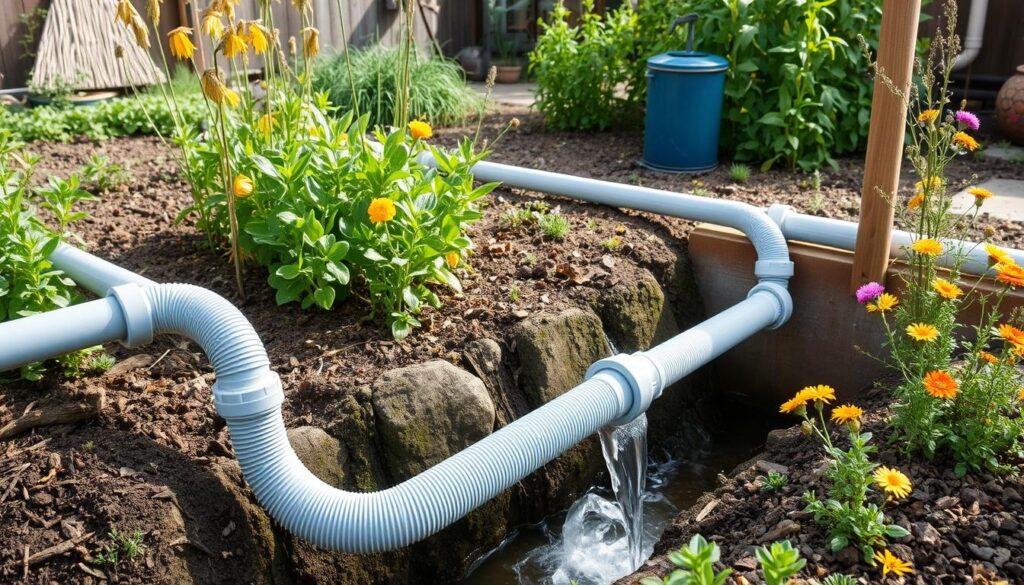
Greywater Systems for Sustainable Living
Greywater systems are an essential component of sustainable living, enabling individuals and communities to reduce their reliance on freshwater resources and minimize their environmental impact. By incorporating greywater systems into their homes and businesses, people can take an active role in water conservation and promoting a more eco-friendly sustainable living lifestyle.
Through the strategic reuse of greywater, individuals can significantly lower their freshwater consumption for activities such as landscape irrigation, toilet flushing, and other non-potable uses. This not only conserves precious water resources but also reduces the strain on municipal water treatment infrastructure, leading to long-term cost savings and a more sustainable water management system.
Integrating greywater systems into a permaculture design further enhances the overall sustainability of a property or community. By using greywater to nourish gardens and landscapes, homeowners can create a closed-loop system that minimizes waste, supports soil health, and fosters thriving ecosystems. This approach aligns with the permaculture principles of working with nature, minimizing inputs, and creating resilient, self-sustaining environments.

